
Prev: @CornellORIE @MSFTResearch, @IBMResearch, @uoftmie 🌈
When: Tuesday, Jan 20, 2026, 8:30am–12:30pm SGT
Where: Garnet 216 (Singapore EXPO)
(Connor’s intro slides are shown here.)
CC @aaai.org




When: Tuesday, Jan 20, 2026, 8:30am–12:30pm SGT
Where: Garnet 216 (Singapore EXPO)
(Connor’s intro slides are shown here.)
CC @aaai.org
I am on the job market this year - check out my website (conlaw.github.io) for more details on what I've been up to.
I am on the job market this year - check out my website (conlaw.github.io) for more details on what I've been up to.
doi.org/10.1007/978-...

doi.org/10.1007/978-...
DiffCoALG bridges the gap between classic algorithms & differentiable learning.
Think: LLM reasoning, routing, SAT, MIP — neurally optimized.
📌 Submit by Aug 22! 🤖🧠
🔗 sites.google.com/view/diffcoa...
#NeurIPS2025

DiffCoALG bridges the gap between classic algorithms & differentiable learning.
Think: LLM reasoning, routing, SAT, MIP — neurally optimized.
📌 Submit by Aug 22! 🤖🧠
🔗 sites.google.com/view/diffcoa...
#NeurIPS2025
Come chat with Haotian at poster W-515 to learn about our work on automatic equivalence checking for optimization models!

Come chat with Haotian at poster W-515 to learn about our work on automatic equivalence checking for optimization models!
🕐 Wed 16 Jul 4:30 p.m. PDT — 7 p.m. PDT
📍East Exhibition Hall A-B #E-1104
🔗 arxiv.org/abs/2502.16380

🕐 Wed 16 Jul 4:30 p.m. PDT — 7 p.m. PDT
📍East Exhibition Hall A-B #E-1104
🔗 arxiv.org/abs/2502.16380
We bring Neural Algorithmic Reasoning (NAR) to the NP-hard frontier 💥
🗓 Poster session: Tuesday 11:00–13:30
📍 East Exhibition Hall A-B, # E-3003
🔗 openreview.net/pdf?id=iBpkz...
🧵

We bring Neural Algorithmic Reasoning (NAR) to the NP-hard frontier 💥
🗓 Poster session: Tuesday 11:00–13:30
📍 East Exhibition Hall A-B, # E-3003
🔗 openreview.net/pdf?id=iBpkz...
🧵
"I Want it That Way": Enabling Interactive Decision Support via Large Language Models and Constraint Programming
🔗: arxiv.org/abs/2312.06908

"I Want it That Way": Enabling Interactive Decision Support via Large Language Models and Constraint Programming
🔗: arxiv.org/abs/2312.06908
LLMs for Cold-Start Cutting Plane Separator Configuration
🔗: arxiv.org/abs/2412.12038

LLMs for Cold-Start Cutting Plane Separator Configuration
🔗: arxiv.org/abs/2412.12038

Possibly --- even a step _forward_?
/s
Possibly --- even a step _forward_?
/s



jobs.uiowa.edu/postdoc/view...
jobs.uiowa.edu/postdoc/view...


